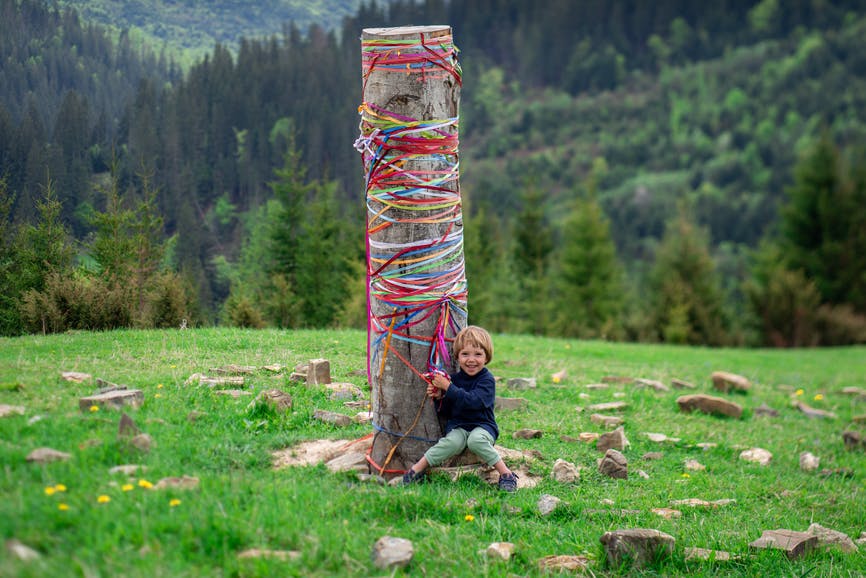Baltic and Slavic Mythology Names
For many parents in the Western world, Greek and Norse mythological names tend to be quite culturally familiar. Names like Atlas, Freya, and Orion have risen through the ranks in places like the United States and Australia in recent years.
If you’re looking to expand your mythology horizons and perhaps glean some special ideas for your little one, it’s worth looking into the rich and fascinating myths from Slavic and Baltic countries such as Lithuania, Poland, and Croatia to be inspired.
The Baltic and Slavic language regions of Europe generally kept pagan beliefs longer than other parts of Europe, and the tales of their gods, goddesses, and other deities continue to be an integral part of folklore and tradition to this day.
A number of these names are still used today for children growing up in Eastern and Northeastern Europe or for those in other countries who have Slavic or Baltic family heritage. Other names are more unique, but still usable.
Perhaps this list will also inspire you to read some of the myths later on to your child —maybe the Lithuanian legend of the Iron Wolf? Don’t forget the famous Stravinsky piece “The Firebird,” derived from Slavic mythology, or the opera “Rusalka” based on the tales of ancient Slavic demons who lured men to their doom (okay, fine, maybe that tale might not be the best choice for a bedtime fable!)
Without further ado, explore the magical world of Baltic and Slavic myths and legends via baby names.
Baltic and Slavic Mythology Girl Names
Many Baltic and Slavic goddess names remain common for baby girls today. Gabija, a former Number 1 name in Lithuania, is currently Number 11, Lada is a Top 100 choice in the Czech Republic, Ziva ranks in the Top 50 in Slovenia, and Dalia is a rising favorite in Bosnia and Herzegovina, now ranked at Number 10.
Aušrinė
Lithuanian, owsh-ryi-nyeh
Morning star female deity
Ciza
Polish, tsee-za
Goddess of breastfeeding and nourishment
Dalia
Lithuanian, du-lyeh
Goddess of weaving and of fate
Danica
Croatian, Serbian, and Slovenian, dah-nee-tsa
Personification of the morning star
Devana
Polish, Czech, Serbian, and Croatian, deh-vah-na
Goddess of the moon, hunting, and wilderness (pictured)
Gabija
Lithuanian, ga-bee-ya
Fire goddess and protector of families and homes
Lada
Czech, lah-da
Goddess of love
Laima
Latvian, lie-ma
Goddess of luck
Māra
Latvian, ma-ra
Goddess of childbirth
Marzanna
Polish, ma-zhan-na
Goddess of seasonal rites and rebirth
Milda
Lithuanian, meel-da
Goddess of love
Mokosh
Proto-Slavic
Goddess of women, childbirth, weaving, and sheep-shearing
Morena
Slovak and Macedonian, mo-rey-na
Goddess of seasonal rites and rebirth
Moryana
Russian and Ukrainian, mor-yah-na
Sea spirit
Niya
Polish, also spelled Nyja, nee-ya
Deity of death
Nyavka
Ukrainian, neeyahv-ka
Temptress spirit
Pogoda
Polish, po-go-da
Goddess of weather
Saulė
Lithuanian and Latvian, suuw-leh
Goddess of the sun
Utrenica
Belorussian, oo-treh-nee-tsa
Personification of the morning star
Vesna
Serbian and Croatian, vehs-na
Goddess of spring
Zaranitsa
Belorussian, za-ra-nee-tsa
Goddess of the dawn
Žemyna
Lithuanian, zheh-myee-nu
Goddess of the earth
Ziva
Proto-Slavic, also spelled Zhiva, zhee-va
Mother goddess
Zorya
Proto-Slavic, zor-ya
Goddess of the dawn
Baltic and Slavic Mythology Boy Names
Slavic and Baltic god names are not used as frequently as their goddess counterparts. Instead, you're more likely to see locational namesakes, such as Kyiv, Ukraine, named after the god Kyi, or Pernek, Slovakia, named after the god Perun.
Ahti
Estonian and Finnish, ahh-ti
God of the ocean
Audros
Lithuanian
God of storms
Hennil
Proto-Slavic, heh-neel
God of agriculture and fertility
Ilmarine
Estonian il-mar-een
Blacksmith who forges the celestial beings
Indrik
Russian, een-dreek
Beast king of all animals
Jarilo
Serbian, Croatian, and Russian, also spelled Jarylo or Yarilo, ya-ree-lo
Deity of rebirth
Jumis
Latvian yoo-mees
God of fertility
Kalev
Estonian, kah-lev
Legendary giant of Estonian mythology
Koliada
Bulgarian, also spelled Kolyada, coal-ya-da
Deity of the New Year
Kovas
Lithuanian, coh-vas
God of war
Kresnik
Slovenian, kress-neek
God of fire
Kyi
Ukrainian, kyee
Legendary founder of the city of Kyiv
Kyvi
Polish, kiv-vee
God of smiths
Peko
Latvian, peh-ko
God of crops and brewing
Perkūnas
Lithuanian
God of thunder (pictured)
Perun
Proto-Slavic, also spelled Peryn, peh-ruhn
God of sky, thunder, lightning, rain and war; the highest-ranking god in Slavic mythology
Shubin
Ukrainian, shoobeen
God of mining
Svetovit
Russian and Ukrainian, svyet-oh-veet
God of war and prosperity
Teliavelis
Lithuanian
Legendary figure who created the sun and placed it in the sky
Tur
Bosnian, toor
Mythological bull that holds the world on his back
Uku
Estonian, uw-kuw
God of weather and the harvest
Velnias
Lithuanian, vehl-nee-as
God of the underworld
Volos
Proto-Slavic, vo-los
God of cattle, earth, and the underworld
Yarovit
Proto-Slavic, yar-oh-veet
God of war


